Technically, this is a 2015 release, which is to say it opened in major U.S. markets in December in the (vain as it turned out) hope of Oscar nods, but it’s only now making its way into what amounts to a wide release in art film terms. In any case, this is a most welcome movie on the often rather barren winter cinema landscape. Put plainly, The Lady in the Van is pretty much a straight-up delight all the way around — so much so that I watched it twice, and would be quite happy to see it again.
Billing itself in an upfront manner as “a mostly true story,” the film tells the story of writer Alan Bennett (Alex Jennings) letting the elderly, difficult, unhygienic “Miss Shepherd” park the van in which she lives in his Camden Town driveway “till she gets things sorted out.” What that sorting out refers to is never clear, but this temporary arrangement is one that lasted 15 years — and gave Bennett the material for a 1999 play, a 2009 radio play, and now this film. Maggie Smith has played the title character in all of them, and Miss Shepherd might have been tailored to her talents.
It is, in fact, a role that it is hard to imagine anyone else inhabiting, though in all honesty the film version at least is as much about Bennett and, to a lesser extent, the other residents of Gloucester Crescent in Camden Town as it is about Miss Shepherd. And it may just be that is the most interesting and penetrating aspect of the film, since it allows the story to consider the nature of poverty, of the elderly and/or addled living in poverty — and to take a little poke at upper middle-class liberal guilt. But the script never overly sentimentalizes Miss Shepherd, nor does it soften her. At one point Bennett records, “I was about to do her a good turn, but, as ever, not without thoughts of strangulation.” And it’s completely understandable.
It is also very much a film about the creative process, which is conveyed in part by offering us two Alan Bennetts (both played by Jennings) who engage in arguments with each other. One of them is much more keen on the idea of using Miss Shepherd’s story — or as much of it as “they” ever know — as material. This also spills over into areas about the lack of strict adherence to the facts. When one Bennett watches an encounter with Miss Shepherd and objects to his other self, “She didn’t say this,” that other self responds, “No, but why shouldn’t she?” And it’s unarguable that a certain amount of dramatization is not only allowable, but may be nearer the spirit of the thing than strict adherence to reality.
In addition to this, it’s a very savvy film. Following a mishap with the aftermath of Miss Shepherd’s bathroom habits, Bennett remarks (while cleaning his shoe), “If and when I write about this, people will say there’s too much about shit.” I had at that moment been thinking that this was true, but when he added, “But there was a lot about shit. Shit was in the forefront. Caring — which is not a word I like — is about shit,” I realized he was perfectly justified. At the same time, when he occasionally allows himself to imagine saying something witheringly on target to Miss Shepherd, his other self upbraids him for not actually having said it, and then comments wryly, “People would say it’s because you’re too nice, but in truth it’s because you’re too timid.” Self awareness is often less than kind.
At bottom, though, this is the story of the impossible, hard-to-like, but impossible-to-dismiss title character and her tragedy — which we only piece together over the course of the film, and even then, like Bennett, are left to fill in the gaps. It is a movie that is funny, sad and utterly charming. It’s definitely one to see. Oh, and if you’re wondering why Frances de la Tour (playing Ralph Vaughan Williams’ widow, Ursula) and Dominic Cooper (playing an unnamed actor and possible boy-toy of Bennett’s) have such small roles, that’s because they (and 17 others) from Hytner’s 2006 film of Bennett’s The History Boys appear in one capacity or another. Rated PG-13 for a brief unsettling image.




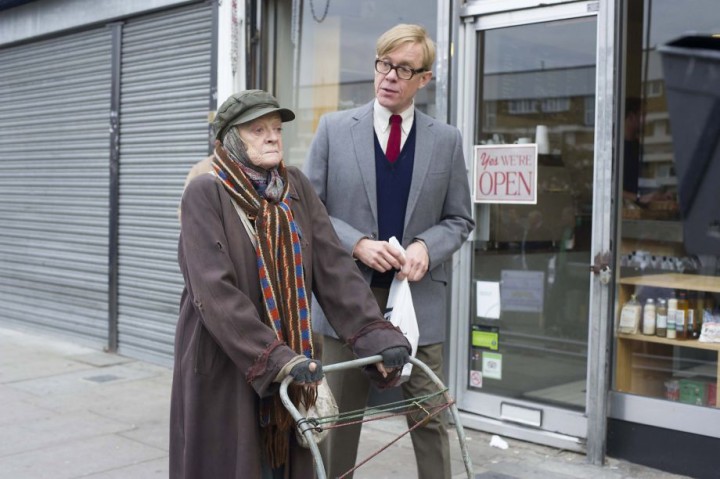
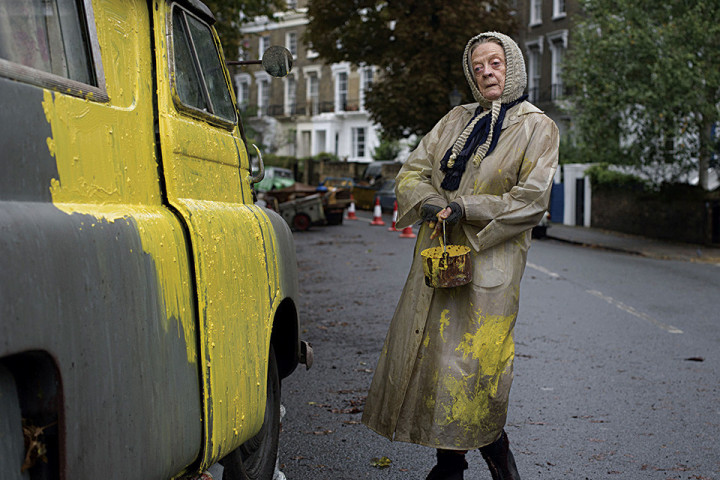
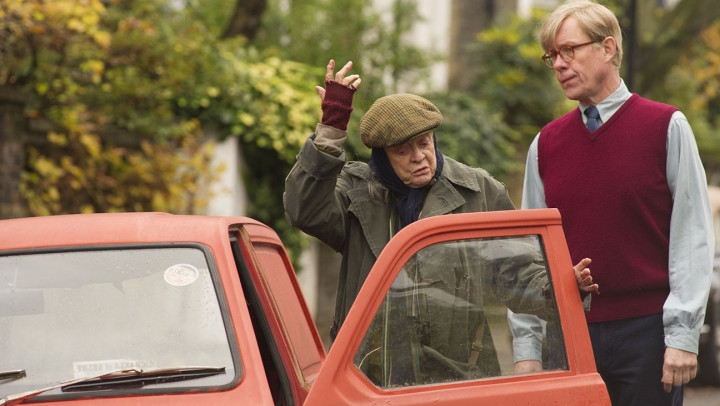
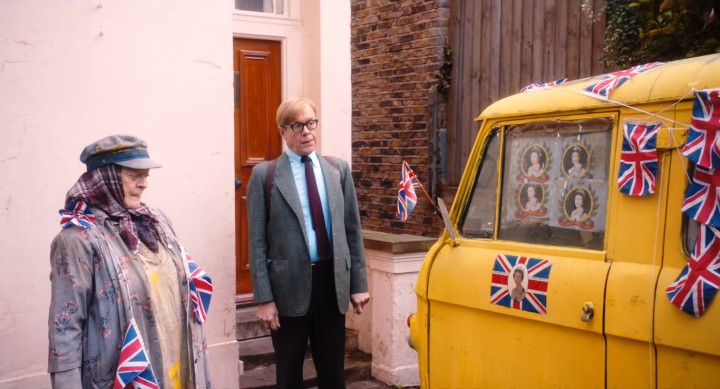
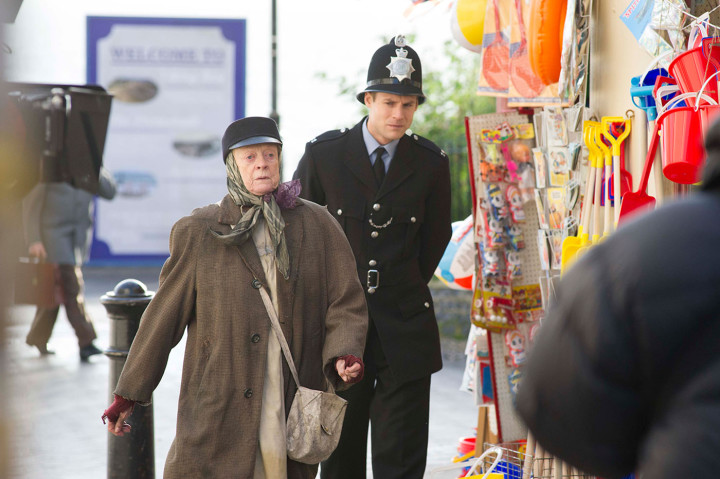
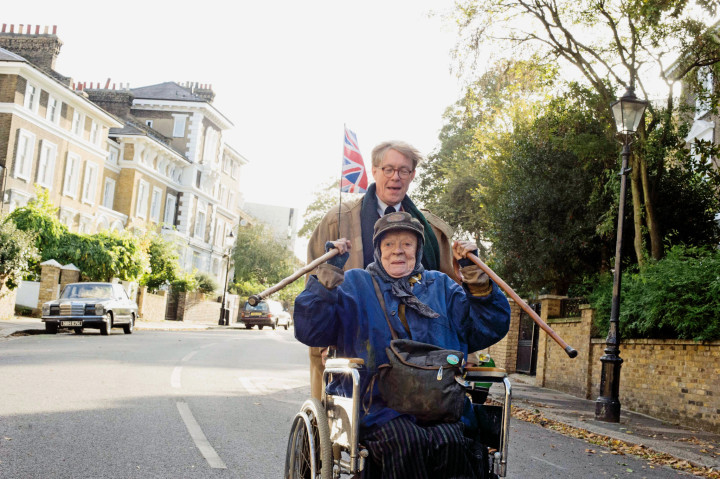
After all this time, I finally got to watch it! I adored it as well, and I’m definitely going to watch it other times!
Its release here in Brazil was limited to the art film circuit, and this is a microcospic circuit around here, so I had to wait for the Blu-ray, but it was worth the wait, especially in a year where crappy comic book movies seem to be getting all the attention of the distributors.
It was very refreshing!
At least you got to see it! It played here quite a while, but then all you need is Maggie Smith and/or Judi Dench in a movie for it play Asheville for weeks and weeks.